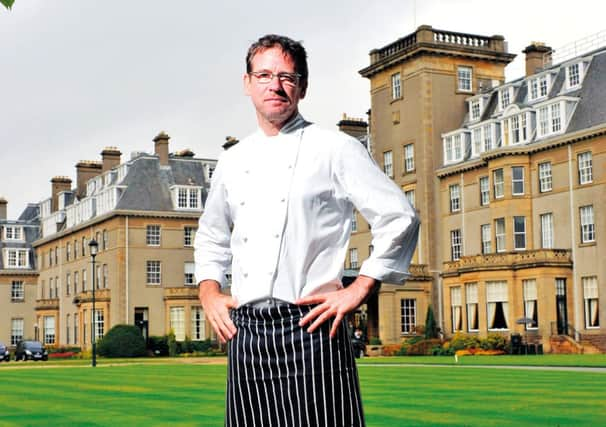Tourists to Scotland ‘let down by quality of food’


Andrew Fairlie, the country’s only Michelin two-star chef, said too many visitors were disappointed and frustrated that they could not sample “authentic” Scottish food on holiday here.
Fairlie, who won huge acclaim when his restaurant at the five-star Gleneagles resort opened 14 years ago, said that the country was still failing to promote its own produce properly.
Advertisement
Hide AdHe said there were still major problems in the industry finding and retaining good-quality staff and insisted that he placed a “massive” emphasis at his Gleneagles restaurant on staff being trained every day and warned that there was a constant need for restaurants to “reinvent” themselves.
Perthshire-born Fairlie spoke out less than three months into the nation’s biggest celebration of food and drink, which is co-ordinated by national tourism agency VisitScotland and industry body Scotland Food and Drink.
Recent research found half of people visiting Scotland want to try local food while two-thirds think quality food is an important factor when deciding where to go on holiday.
However, speaking at a Scottish Tourism Week event, Fairlie dismissed a suggestion that Scotland had finally become “a land of food and drink”.
He said: “We’re not there yet. We’ve made some huge strides. At the Michelin end of the market, other big cities in the UK can’t touch Edinburgh. At other ends of the market we’re not doing so well, but it wouldn’t take much to nudge it forward.
“There are a lot of little things hotels and restaurants could do that would make a remarkable difference, such as pointing out to people they’re actually eating Scottish food. We’re brilliant at catching it, harvesting it and the husbandry, but we’re not very good at promoting ourselves.
Advertisement
Hide Ad“We also give a lot of it away and sell our crown jewels short. My experience of talking to foreign tourists is that they’re a bit disappointed they can’t taste authentic Scottish food. It’s a big frustration for them. They’re looking for that authenticity. It can be something simple like serving the best porridge.
“As a Scottish person, living in Scotland, who is passionate about Scotland, I get very frustrated about it as well, as a tourist in my own country. You buy a baked potato and it’s cheap, white and watery. It’s not that difficult.”
Advertisement
Hide AdFairlie said many problems with hospitality businesses were down to recruiting “the wrong people”. He said young chefs applying to work with him are put through a “gruelling” recruitment process at which “commitment and attitude” are all-important.
He said: “Everybody struggles in our industry. People think that with a two-star Michelin restaurant there are people queuing up to work in the kitchen or the restaurant. It’s not the case at all.”
Fairlie said “every single person” he knew in the hospitality industry had problems finding the right staff and that retention was “very, very difficult”.
He added: “I figured out a long time ago that the only way to do it is to bring then in young, train them and never stop training them. We have to offer them something.
“They don’t just come for the money, because we don’t pay huge wages and it’s a difficult work-life balance. I always say to our guys is that as soon as we stop training people will stop learning. It’s something we do every single day.
“It’s a large investment for a small business like mine, but the money we save on re-recruiting and disturbance to the business is massive.
Advertisement
Hide Ad“What you find with a lot of employers is they recruit the wrong people. It’s actually quite hard to get a job with us. We put people through a gruelling interview process and ask people half a dozen times: ‘Are you ready for this? Are you sure you want this?’ We’re looking for commitment and attitude. We’ve not had to fire anyone for 14 years.”
James Withers, chief executive of Scotland Food and Drink, insisted there had been a “transformation” in the amount of local food and drink available in Scotland in recent years, but admitted there was still much to do.
Advertisement
Hide Ad“We’ve gone from a nation with no farmers markets 15 years ago to having one in virtually every major town in the country.
“There’s also a new generation of artisan producers emerging and adding colour to a landscape marked by world-famous brands too. A vast swathe of our tourism sector has embraced what’s being produced on their doorstep.
“The picture is good and getting better, but there are still ‘blind spots’. I’d agree entirely with Andrew’s point that many hotels and restaurants are in fact serving local food and drink, but they’re not communicating it to their customers. If menus and staff don’t shout about provenance, it’s a missed opportunity.
“We know that a fifth of visitor spend in Scotland is on food and drink. And with the exception of sightseeing, it is top of the list of things people want to experience when they come here. So, it is a big economic opportunity for tourism and will drive people to come back.”
Malcolm Roughead, VisitScotland’s chief executive, said his organisation now had more than 600 tourism businesses accredited to a “Taste Our Best” scheme which recognises a commitment to include and promote Scottish produce on their menus.
He added: “We know that sampling traditional dishes and local produce is among the most popular activities undertaken by visitors.
Advertisement
Hide Ad“Throughout this year we will be actively showcasing the nation’s natural larder in our marketing both in the UK and overseas, with a focus on connecting ‘plate to place’.
“Our outstanding natural larder will also be showcased at a number of events held throughout the year, whilst a series of monthly themes has been created to help highlight key food and drink sectors such as seafood, whisky and soft fruits.”
FOLLOW US
SCOTSMAN TABLET AND MOBILE APPS